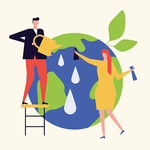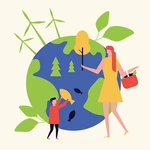CSIRO Sustainability Network
The CSIRO Sustainability Network was set up in 2001 as a free and open "virtual learning community of practice" dedicated to inclusive exchange of ideas and information on sustainability – across science disciplines within CSIRO, and across enterprises, professions, disciplines and generations generally.
On completion in June 2007, it has grown to over 1,400 subscribed members, some inside CSIRO, but the majority outside in business, industry, education, government (all levels), NGOs, and the community – nationally and internationally – with ages ranging from teens to over 90. As you might expect for a CSIRO-led activity, there has been some emphasis on scientific and technological trends and resources but, since sustainable development is all about the integration of economy, environment and society, consideration has gone far beyond the purely technological to encompass the socio-economic context in which science and technology are applied.
The Facilitator’s job has been to supply the Network with relevant, summarized, trend information, and to make linkages – among pieces of information and between people. In fact you could say that one aspect of the job has been to deliberately "drown" in all the sustainability information to help others "keep their heads above water" – to listen to the "chatter" and find the genuine trends and thought-provoking concepts. This has been done using 4-6 weekly newsletters to avoid the excesses of email associated with some electronic information services.
Much of the newsletter content has been supplied by Network members themselves, with collation and linkages by the Facilitator. The philosophy behind the Network is that the creativity needed to build more sustainable pathways of development lives not just in "temples of knowledge" but within individuals in all age groups and all levels, right across the world community – and ideas are the fuel to fire it up! Change is too important and too urgent to depend on the top-level decision makers of today; we need dialog at all levels – and especially with the decision makers of tomorrow.
The way information flows is also important - it needs to be two-way, reciprocal, multidimensional - not just one way. Furthermore, horizontal linkages within informal networks are just as important as the vertical information flows within formal organizations and businesses. While it can sometimes frustrate those who like to severely focus their attention, the truth of the matter is that sustainability is a complex, interrelated set of issues, and often we don't know where we will find relevant ideas and information until after we have found them.
Newsletter content has therefore been kept broadly interdisciplinary.




